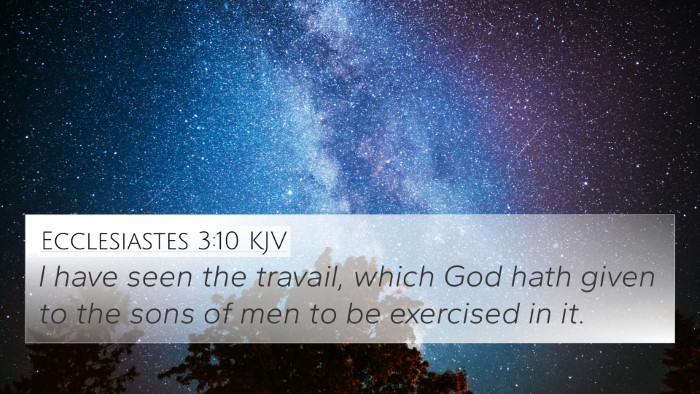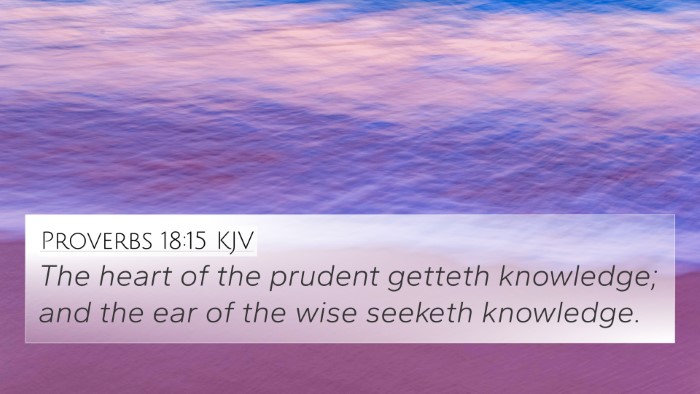Understanding Ecclesiastes 1:13
Ecclesiastes 1:13 reads: "And I gave my heart to seek and search out by wisdom concerning all things that are done under heaven: this sore travail hath God given to the sons of man to be exercised therewith." This verse encapsulates Solomon's quest for meaning amidst life's complexities, highlighting the burden that comes with seeking wisdom.
Summary of Insights
This verse emphasizes several fundamental ideas:
- Seeking Wisdom: Solomon expresses his commitment to pursue knowledge and wisdom in understanding human existence.
- The Burden of Knowledge: The pursuit of wisdom is portrayed as a "sore travail," indicating that deeper insight into life can bring with it burdens and responsibilities.
- Divine Insight: The notion that God has ordained this search for wisdom suggests that such endeavors are part of divine design for humanity.
Commentary Insights
Matthew Henry's Commentary
Matthew Henry notes that Solomon, having accessed vast resources and experiences through his wealth and status, found himself troubled by the enigma of life. His quest for understanding reflects a natural yearning of the human soul to grasp the meaning of existence. Solomon's reflections convey the reality that the pursuit of wisdom often entails significant effort and inner turmoil.
Albert Barnes' Commentary
Albert Barnes highlights the systematic approach Solomon undertakes in his search for knowledge, showcasing a methodical reflection on life’s purpose. The "sore travail" mentioned indicates not just physical labor but emotional and existential struggle, suggesting that enlightenment often comes with hardships that must be faced head-on.
Adam Clarke's Commentary
Adam Clarke emphasizes that the quest for wisdom is divinely appointed. He suggests that Solomon's experiences serve as a reminder of human limitations in comprehending the vast complexities of life. He also stresses that wisdom and knowledge are gifts from God, leading to a realization that we must approach these pursuits with humility and reverence.
Bible Verse Cross-References
Ecclesiastes 1:13 is related to several other biblical themes and verses:
- Proverbs 1:7: "The fear of the Lord is the beginning of knowledge." This verse underscores the foundation of wisdom as acknowledging God.
- James 1:5: "If any of you lack wisdom, let him ask of God, that giveth to all men liberally." This promotes the idea that wisdom is a divine gift that can be requested through prayer.
- 1 Corinthians 3:20: "The Lord knoweth the thoughts of the wise, that they are vain." This suggests the futility of human wisdom without divine insight.
- Ecclesiastes 12:12: "Of making many books there is no end; and much study is a weariness of the flesh." This verse reflects on constant learning as a burden, aligning with the theme in Ecclesiastes 1:13.
- Proverbs 3:5-6: "Trust in the Lord with all thine heart; and lean not unto thine own understanding." This aligns with the idea that relying on human wisdom alone is insufficient.
- Job 28:28: "And unto man he said, Behold, the fear of the Lord, that is wisdom." Here, the connection between divine reverence and wisdom is cemented.
- Isaiah 55:9: "For as the heavens are higher than the earth, so are my ways higher than your ways." It emphasizes the vast difference between divine and human wisdom.
Thematic Connections
The verse invites a comparative Bible verse analysis using insights from different passages. These cross-references are pivotal in comprehending the broader theological context surrounding human pursuit of wisdom:
-
Wisdom and Understanding: The quest for wisdom is consistently explored throughout Scripture, showing the importance placed on acquiring knowledge.
-
Human Limitation: Many verses highlight the inherent limitations of human understanding, resonating with Solomon’s acknowledgment of the burdens attached to seeking wisdom.
-
Divine Sovereignty: The role God plays in granting wisdom emphasizes the need for divine assistance throughout our journeys.
Tools for Bible Cross-Referencing
For those seeking to delve deeper, there are numerous tools available for Bible cross-referencing. These resources can help uncover the intricate web of interconnected verses:
- Bible Concordances: Useful for locating verses by keywords.
- Bible Cross-Reference Guides: Offer structured connections between related verses.
- Cross-Reference Bible Study: Methods that promote thematic exploration of scriptures.
- Bible Chain References: Systems that link verses thematically or contextually.
- Online Bible Study Platforms: Digital resources providing extensive cross-referencing capabilities.
Conclusion
Ecclesiastes 1:13 serves as a profound reminder of the urgency and weight of the pursuit of wisdom in a world filled with uncertainties. By connecting it to other scriptural references, one can appreciate the layered meanings behind this pursuit, fostering a richer and more comprehensive understanding of the Biblical texts. Through diligent study and cross-referencing, believers are equipped to interpret these profound truths and apply them to their lives.



















